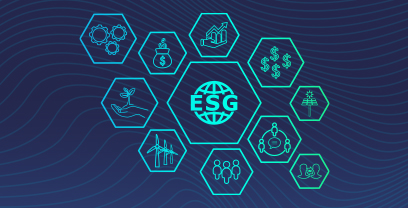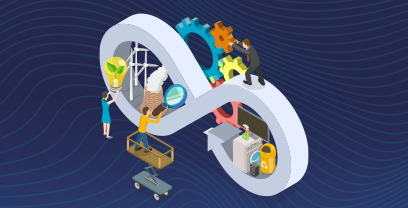|
The Forrester Wave™: Supplier Value Management Platforms, Q3 2024 See Report
Blog »
5 Tips to Leverage Digital Tools to Deliver Tangible Sustainability Improvements

This blog post provides excerpts from a recent webinar that Ivalua conducted with the Michelin Group and Procurement Leaders. To view the full webinar replay, please click here.
Speakers: Arnaud Malardé, Ivalua | Hélène Vermont, Michelin Group
With mounting pressure for organizations to make tangible contributions to Environmental, Social, and Governance (ESG) initiatives, the procurement function must strategize to implement and report their collective efforts. Buyers are expected to scrutinize every aspect of the purchasing process to identify ways to reduce their carbon footprint, source sustainable materials, and promote diversity. The amount of data associated with these initiatives can be exponential, a burden too heavy to manage manually. As the sourcing function evolves, digital procurement technologies have become crucial tools for buyers to capture and report their sustainability achievements.
Below, Ivalua’s Arnaud Malardé discusses 5 tangible, actionable strategies that buyers can implement to improve their sustainability efforts. Michelin Group’s Hélène Vermont joined the discussion to share how applying these practices has propelled her procurement team to emerge as a leader in sustainability and Corporate Social Responsibility.
1 . ESG Objectives for Buyers
Arnaud (Ivalua) – Buyers’ objectives have expanded over the years – initially responsible for savings and cost avoidance, Byers were then tasked with handling risk management, and also expected to contribute to the organization’s sustainability initiatives.
ESG initiatives give the opportunity for businesses to grow, remain competitive, and innovate with new suppliers, but they also add a layer of complexity to procurement processes. This is where advanced procurement technology can help – to enable buyers to embed their ESG objectives into a Source-to-Pay system, measure their progress against these goals, and report how procurement is directly impacting the organization’s sustainability efforts.
Hélène (Michelin Group) – Our Buyers’ objectives have indeed evolved over the years based on their level of maturity, portfolio, and quantitative or qualitative objectives. Where procurement technology really comes into play is helping us to manage our quantitative objectives. Ivalua’s digital platform will give Michelin the ability to benchmark our progress toward achieving key ESG goals in the procurement process, to include:
- The amount of spend in each category that has been assessed on ESG criteria
- The percentage of purchased goods emissions by suppliers with science-based targets
- The number of Requests for Quotation that have been completed through an e-sourcing platform, and how many include a CSR criteria
2. Supplier Selection
Arnaud (Ivalua) – When buyers select a supplier, they have many criteria that they are assessing them on. It would be simple if buyers were only looking for the lowest-cost supplier, but they have to consider other factors as well such as price, transport, lifecycle of the product, and environmental and social components. Measuring against all of these criteria and more to select a supplier is extremely complex, and this is where advanced procurement technology is particularly useful – it allows buyers to embed ESG and other criteria into the actual supplier selection process.
Automation capabilities allow buyers to account for a number of factors, weigh the importance of each, and optimize award scenario analyses to choose the supplier that best meets their needs. In fact, the more criteria measured, the more useful the platform. For example, if a buyer asks a supplier via an RFP questionnaire what their product carbon footprint is, advanced procurement technology can compare this carbon footprint to other suppliers, weigh it against the cost and delivery of the item (if it’s local or not), and show what level of risk is associated with the supplier. The technology allows for this type of flexibility to help buyers make the best and most informed decisions that will help them choose the best supplier for their needs – every time. Additionally, if the criteria selected does not yield existing suppliers in their database that are mature enough in sustainability or ESG areas, the technology can discover new suppliers that are more aligned with their ESG goals and initiatives.
Hélène (Michelin Group) – It is important for Michelin to have our Corporate Social Responsibility (CSR) criteria in mind during the entire purchasing process, not just during the RFP stage. The aim of these criteria is to source from sustainability-focused suppliers who are focused on sustainability who provide CSR visibility and performance into their products and services offering. The solution can effectively streamline the questionnaire portion of the RFP process (eliminating Word and Excel) and creating a more convenient, traceable process.
3. Supplier Performance Evaluation
Arnaud (Ivalua) – ESG criteria can also be applied at the supplier performance management level when buyers are evaluating their suppliers. Advanced procurement technology allows buyers to create scorecards to rate their suppliers against any number of KPIs including price, quality, strategic fit, compliance, and sustainability. What the tool really gives them is an architecture for collaborative data from multiple sources, including the buyer, the supplier, and other internal and external stakeholders. Without a centralized view of all of this information, buyers may struggle to make strategic decisions. The scorecards used on a digital procurement platform combine this information and allow buyers to easily benchmark categories and suppliers against other options, highlighting the most suitable choice and indicating where improvement plans should be put in place.
Hélène (Michelin Group) – Michelin is continually focused on ESG initiatives, before and after a contract is signed, and during the supplier relationship/performance management process. Technology has allowed us to assess performance beyond our direct suppliers – to evaluate the natural rubber supply chain all the way to the farmer level to accurately identify environmental and human/labor rights risks. Additionally, after proper risk assessments, we can then set up remediation projects to tackle these areas and address the risks.
4. Reporting: Capturing Sustainability Efforts
Arnaud (Ivalua) – The reporting requirements for buyers are multiplying when it comes to sustainability. Procurement teams must adhere to internal reporting or audit compliance standards along with data, diversity, and sustainability regulations. In many countries, teams face increasing financial obligations and societal contributions. Further, a company’s environmental impact can influence whether or not they qualify for loans or other financial aid in certain cases. Without a system in place to quantitatively capture the contributions buyers are making to the organization’s sustainability goals, many of their efforts will get lost in the shuffle and procurement will not receive credit for the good work they are doing.
Hélène (Michelin Group) – Reporting on sustainability efforts is complex and teams must adhere to utilizing a centralized information system to capture relevant data. As Michelin is expected to provide detailed reports under pressing deadlines, we really start to see the value of an integrated technology platform. Ivalua’s solutions provide a high level of data capture and reporting that helps us gain a global view of spend and regulatory compliance. For instance, we are reporting on the greenhouse gas emissions of all the goods and services we buy, and it would be incredibly complicated and time-consuming to capture and analyze this data without a centralized, comprehensive reporting capability.
5. Ordering and Catalogs
Arnaud (Ivalua) – While buyers may choose to align with sustainable suppliers, certain products and services provided by “less” sustainable suppliers actually have a lower carbon footprint or higher ESG score. Advanced procurement technology allows buyers to view information at a more granular level and make strategic decisions around sustainability. For instance, smart catalogs with ESG criteria will “flag” preferred items in particular areas, such as the most eco-friendly products, or services with the best diversity strategy. These smart catalogs help guide users to the products and services that will make the most impact on the organization’s sustainability goals.
Hélène (Michelin Group) – Michelin has developed two “smart” tools–the first is an internal marketplace tool where we tag parts and materials with a green logo to indicate whether or not they have been refurbished (these items are not only more environmentally friendly, but they typically cost less as well). We also tag products and services that come from inclusive suppliers (i.e. those in sheltered areas) with a blue heart logo. These labels allow buyers in the plants to select these items first, contributing further to our overall sustainability efforts.
Ivalua will continue to leverage transformative tools to make positive and measurable contributions to global Environmental, Social, and Governance (ESG) initiatives. Partnering with companies like Michelin, we can work together to collectively reach these goals to build a more sustainable future for our planet.
Ivalua is the smart procurement platform solution built to work with your existing business processes to help you make better, faster, and more sustainable procurement decisions. To learn more about how Ivalua can help your organization achieve their sustainability goals, click here.

Arnaud Malardé
Senior Product Marketing Manager
Arnaud Malardé, Senior Product Marketing Manager, joined Ivalua with over 10 years of experience in several procurement positions. An accomplished industry and procurement expert, Arnaud has worked alongside prestigious international Financial Services, Retail, IT and Media organizations. A product thought leader, blog contributor, and webinar host, Arnaud offers valuable and innovative insight into advanced digital procurement solutions. He holds a Master in Finance from ESCP Europe, one of the top French business schools, and a European Master of Science in Management from London’s City University.


